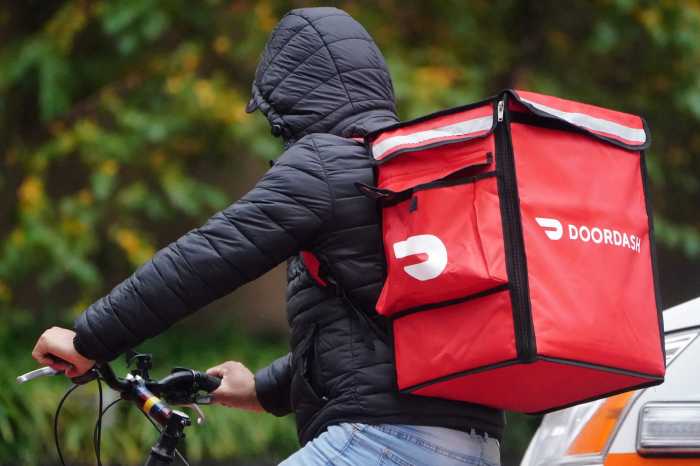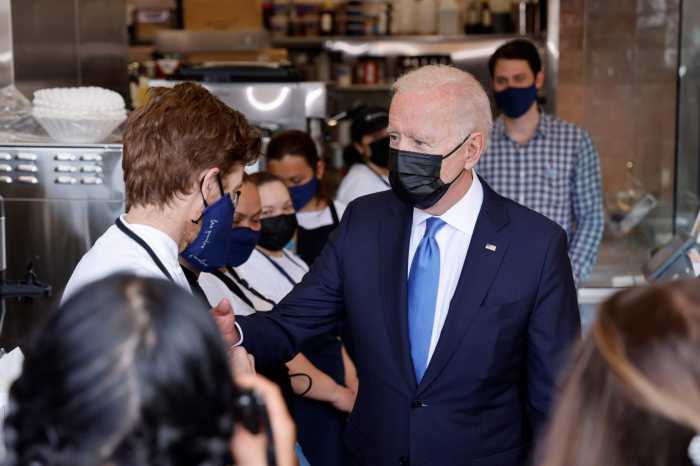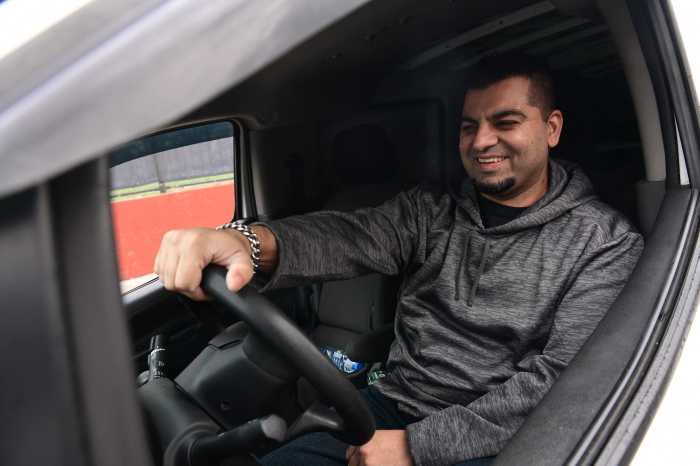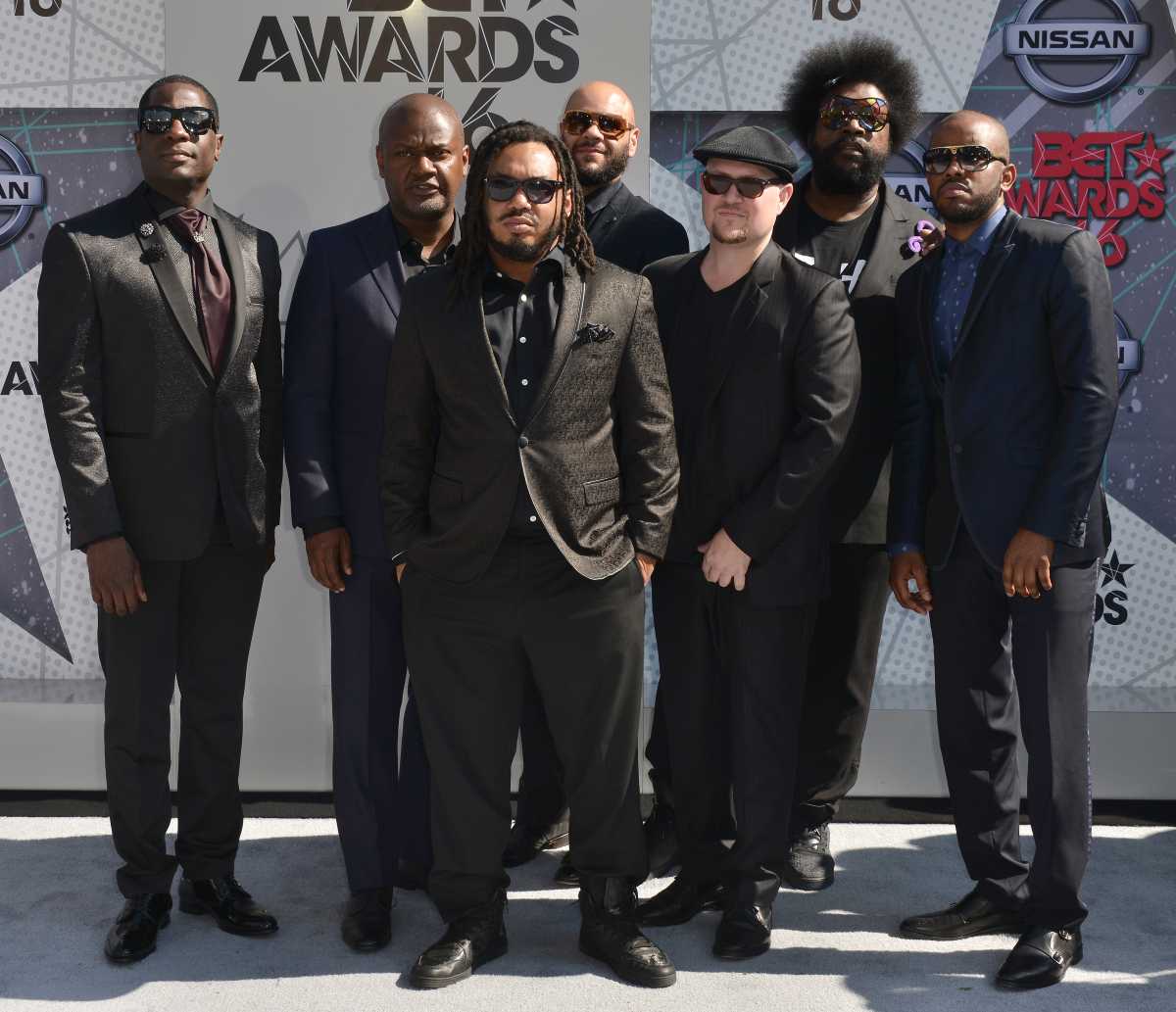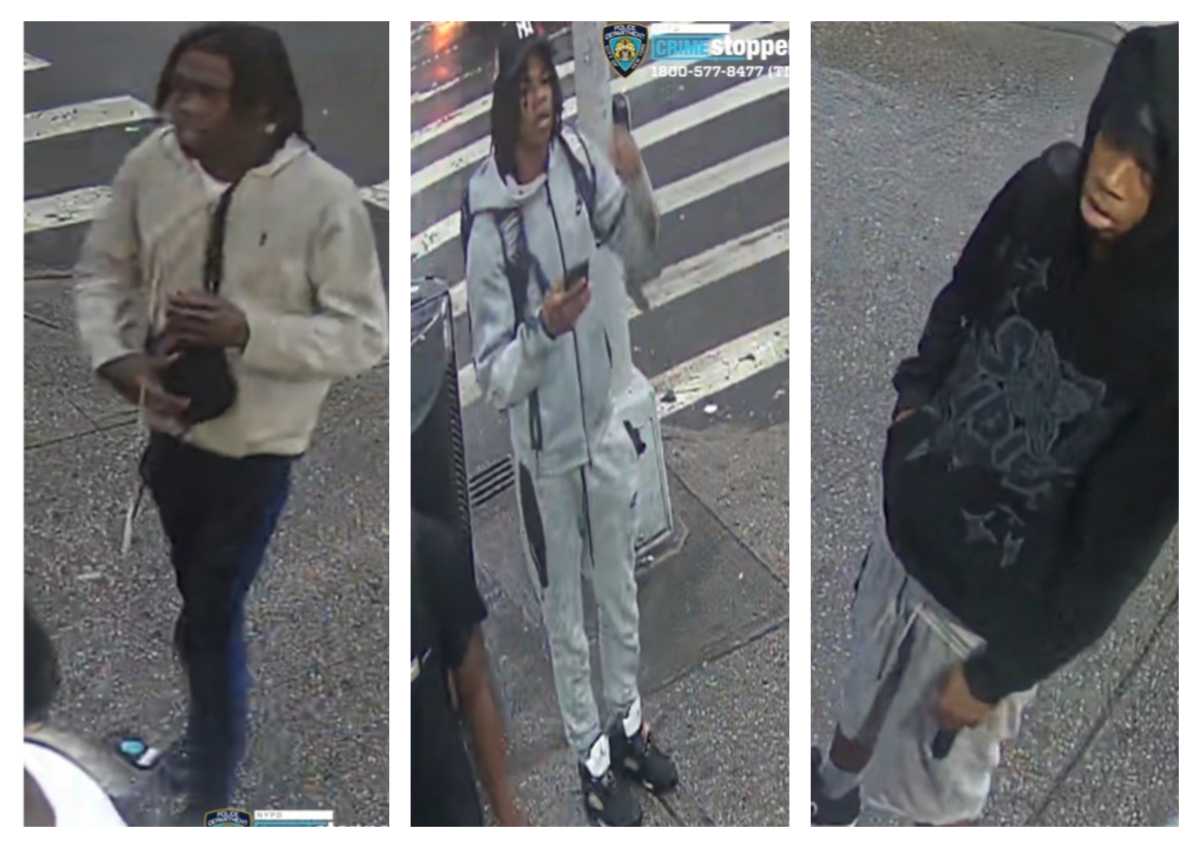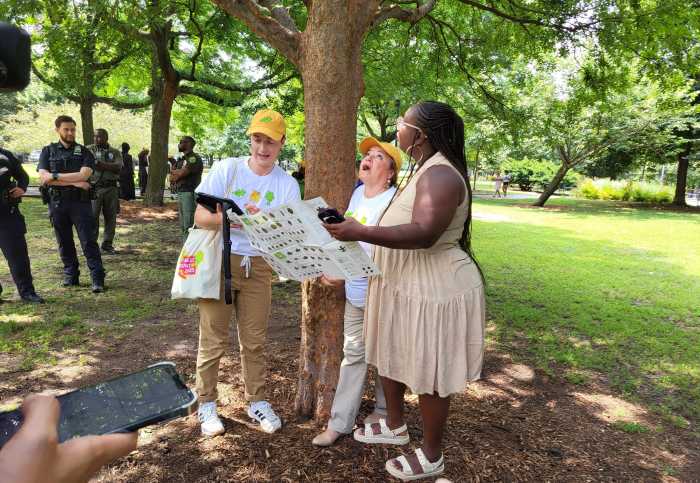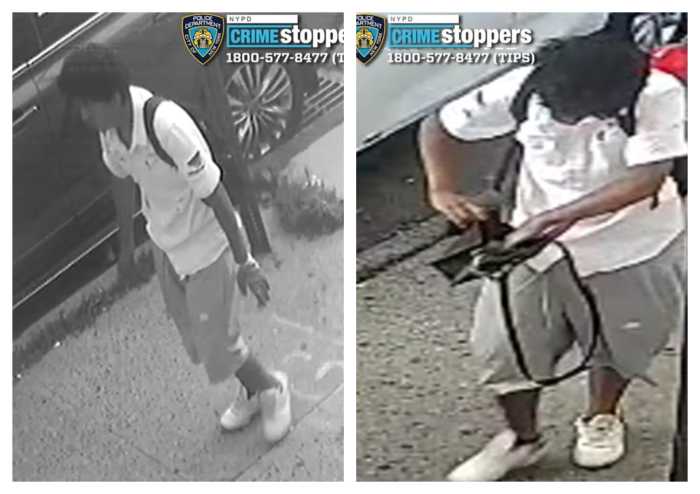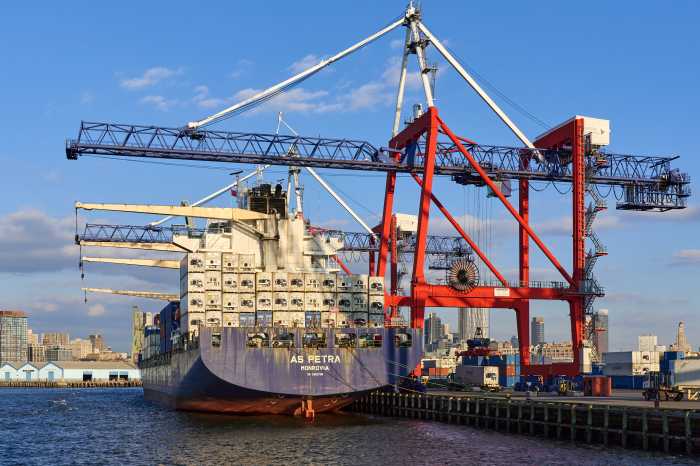This article was originally published on by THE CITY
City lawmakers are acting to aid workers in the booming multi-billion dollar app-based food delivery industry, scheduling a vote for Thursday on a landmark slate of bills intended to ensure bathroom access, minimum pay and more.
The proposals were sparked by the activism of Los Deliveristas Unidos, a labor organization of immigrant delivery couriers who kept New Yorkers fed during the pandemic. Supporters say the New York effort to provide minimum working standards for app-based couriers is the first of its kind in any major U.S. city — and they hope the measures will influence local governments across the country.
Mayor Bill de Blasio on Wednesday announced his support for the measures, which come as the city fends off dual lawsuits from delivery giants over previous Council-passed regulations on their business.
“The exploitation of delivery drivers is unacceptable,” Bill Neidhardt, a de Blasio spokesperson, told THE CITY. “City Hall wholeheartedly supports these bills to protect delivery workers and deeply appreciates the grassroots organizing of Los Deliveristas Unidos to make this possible.”
But unlike prior Council bills tied up in court battles, the new package has the full support of at least one app company, Grubhub.
The new package of six bills would allow food couriers access to restaurant bathrooms, put limits on how far they can be asked to deliver, set minimum payments per trip and ensure that tips get to workers.
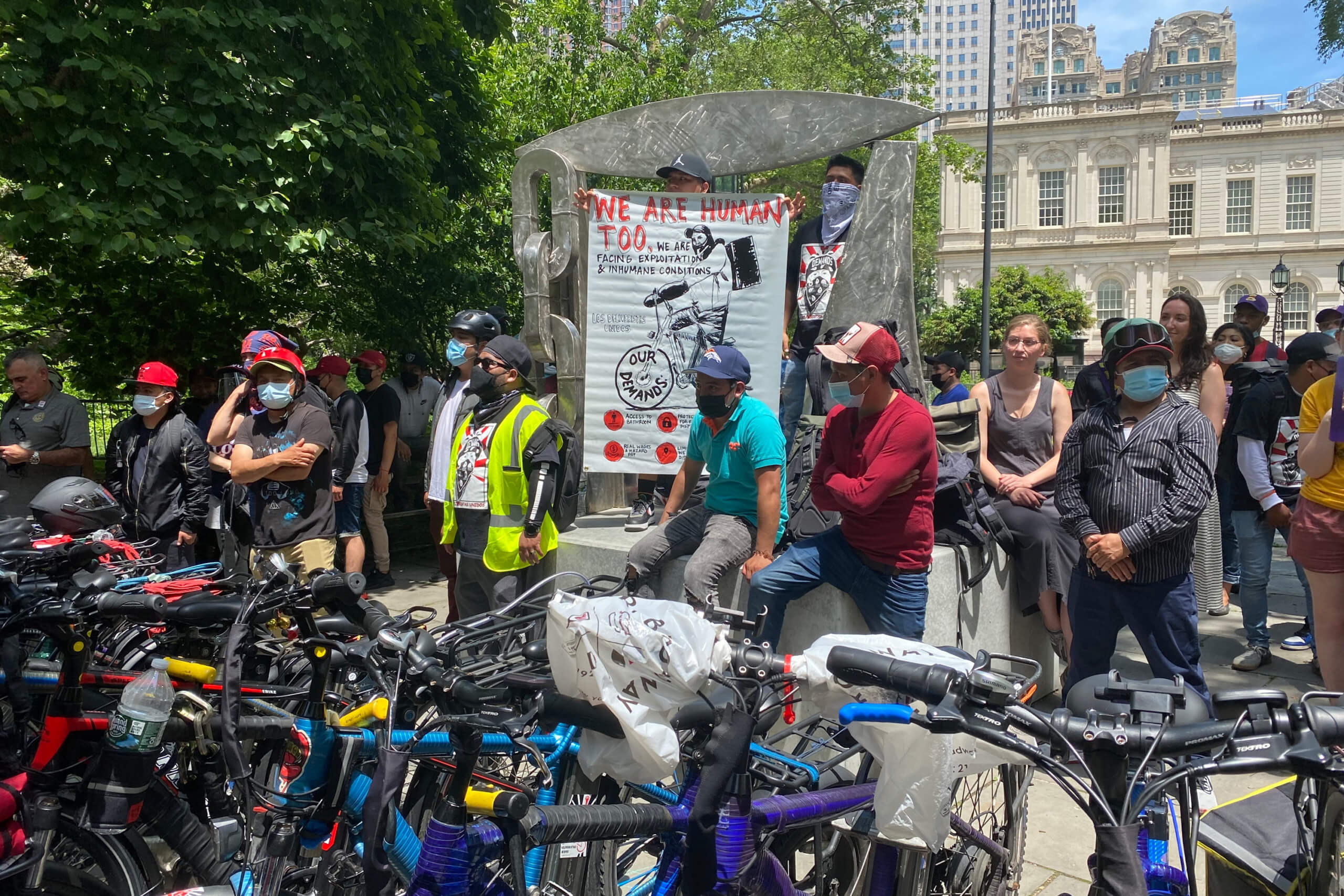
For the first time, City Council Speaker Corey Johnson (D-Manhattan) declared his support Tuesday night.
“The basic human dignity of delivery workers, many of whom are immigrants, has been ignored for too long across the country,” said Johnson in a statement. “New York City is taking the lead in transforming this industry with a legislative package that will give deliveristas the rights they deserve.”
Sergio Ajche, a Guatemalan food delivery worker from Brooklyn and one of the leaders of the grassroots immigrant labor collective Los Deliveristas Unidos, said he’s feeling “happy and optimistic” over the expected approval of the bills.
“We have the support of a good group of elected officials, and that helps us muster strength to keep fighting. These six bills will help workers, but they’re not enough,” Ajche told THE CITY in Spanish. “Only time, each passing day will inform us what else we should change and demand. Every day more delivery workers are getting together and the movement grows. We’re making progress.”
‘Fierce Determination’
The City Council vote comes nearly a year after THE CITY first reported workers beginning to unite over the perilous and exploitative nature of app-based delivery work, including lack of bathroom access, alleged wage theft, insufficient pay, and reports of muggings and robberies.
Restaurant staff denying bathroom access became a galvanizing issue in the early days of the pandemic, as indoor dining shut down, as did most other restroom options — and the takeout business boomed.
The bill from Councilmember Carlina Rivera (D-Manhattan) would require most restaurants to allow delivery workers picking up an order to use the bathroom if requested.
The measure also would grant the city Department of Consumer and Worker Protection the power to fine bars and restaurants that deny restroom access to couriers up to $50 on the first offense and $100 for every subsequent violation.
Rivera told THE CITY she’s been working with the Deliveristas for nearly two years to come up with a package of bills.
“Though this battle has been long and hard-fought, the fact that the Council will be voting on our legislation just a few short months after introduction is a testament to the organizing power and fierce determination of our city’s Deliveristas,” Rivera said.
Storm Showed Dangers
The working conditions of app-based food couriers came under further scrutiny earlier this month when the remnants of Hurricane Ida barrelled down on New York City, dumping a record amount of rain, paralyzing mass transit and leaving drivers stranded on roadways.
Workers hauled outside in hip-deep water for meager pay as orders continued coming in. Images of food couriers wading through the deluge quickly began circulating on social media, reigniting public conversation over hazardous conditions workers face.
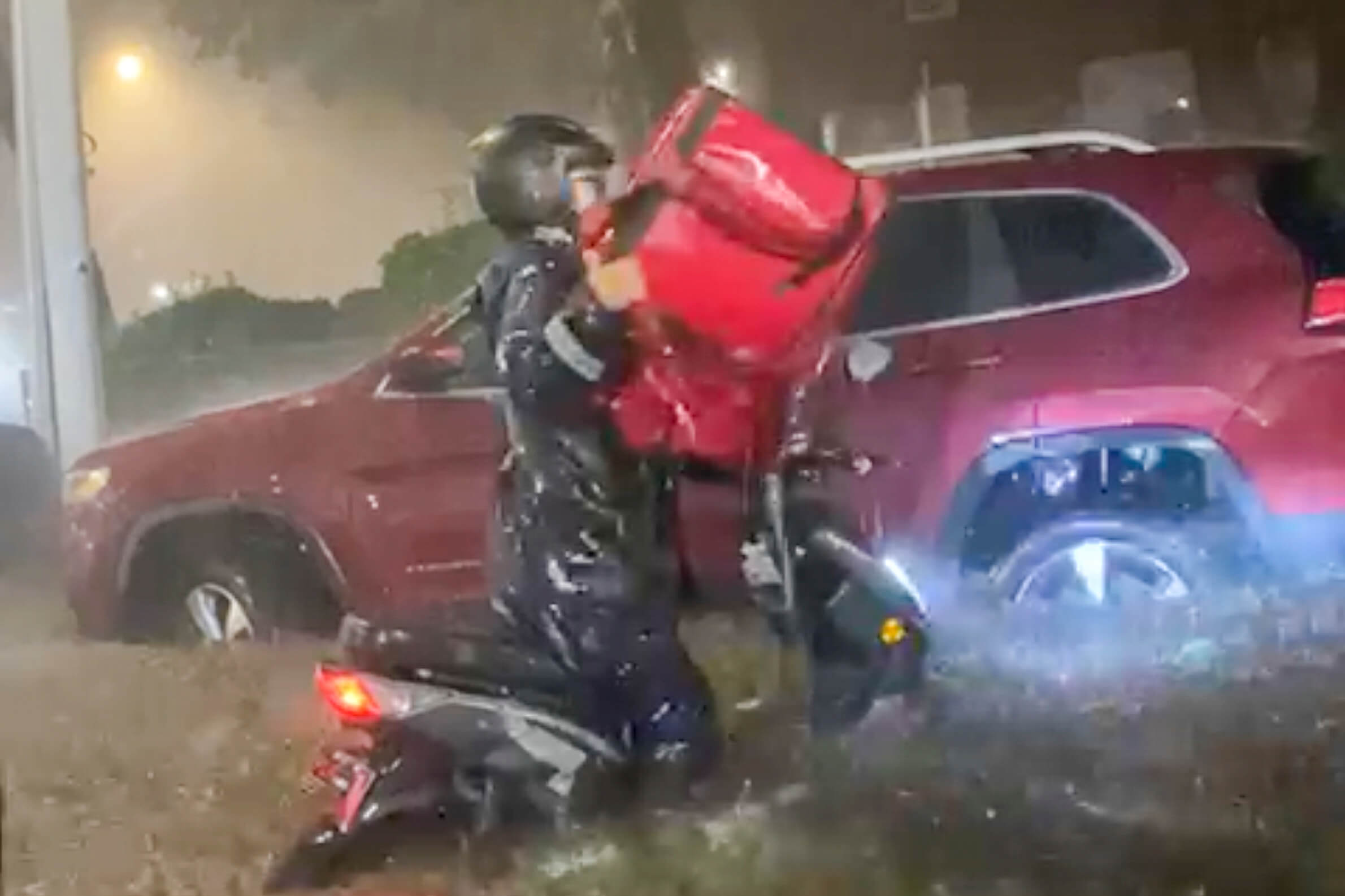
Toño Solís, a delivery worker and member of the Deliveristas, told THE CITY that he earned just $5 for an hour-long trip to deliver a meal in Brooklyn from Astoria the night of the downpour, including tip.
He made just $115 during the 9.5 hour workday, roughly $12 an hour, with tips — lower than New York’s $15-an-hour minimum wage. The apps treat couriers as independent contractors, not employees, leaving them exempt from minimum wage requirements.
Council bill sponsors say the crisis for workers runs deeper.
“We shouldn’t have needed a pandemic, or a hurricane, for us to recognize that Deliveristas are essential workers who deserve essential rights,” said Councilmember Brad Lander (D-Brooklyn), who’s advancing a measure to regulate drivers’ pay.
How these so-called gig workers get classified by employers has become a major issue nationally. A New York State proposal that would have allowed gig workers to unionize but stopped short of reclassifying them as employees failed to gain support in Albany.
Last month, a California trial court dealt a blow to tech companies over a successful 2020 ballot proposition that allowed gig workers to be reclassified as independent contractors, ruling that it was unconstitutional.
A survey of 500 New York City app-based food delivery workers released last week found that workers on average earn less than the state’s minimum wage and that pay is often unreliable, with money coming in late and tips whittled down or missing.
Food delivery workers reported earning an average of $7.87 an hour before tips and about $12.21 an hour with tips included, far less than the $33 food delivery company DoorDash claims its Manhattan couriers earn.
The bill introduced by Lander, who is running for city comptroller, would establish minimum per-trip payments for delivery workers, similar to protections that the city’s Uber and Lyft drivers already have in place.
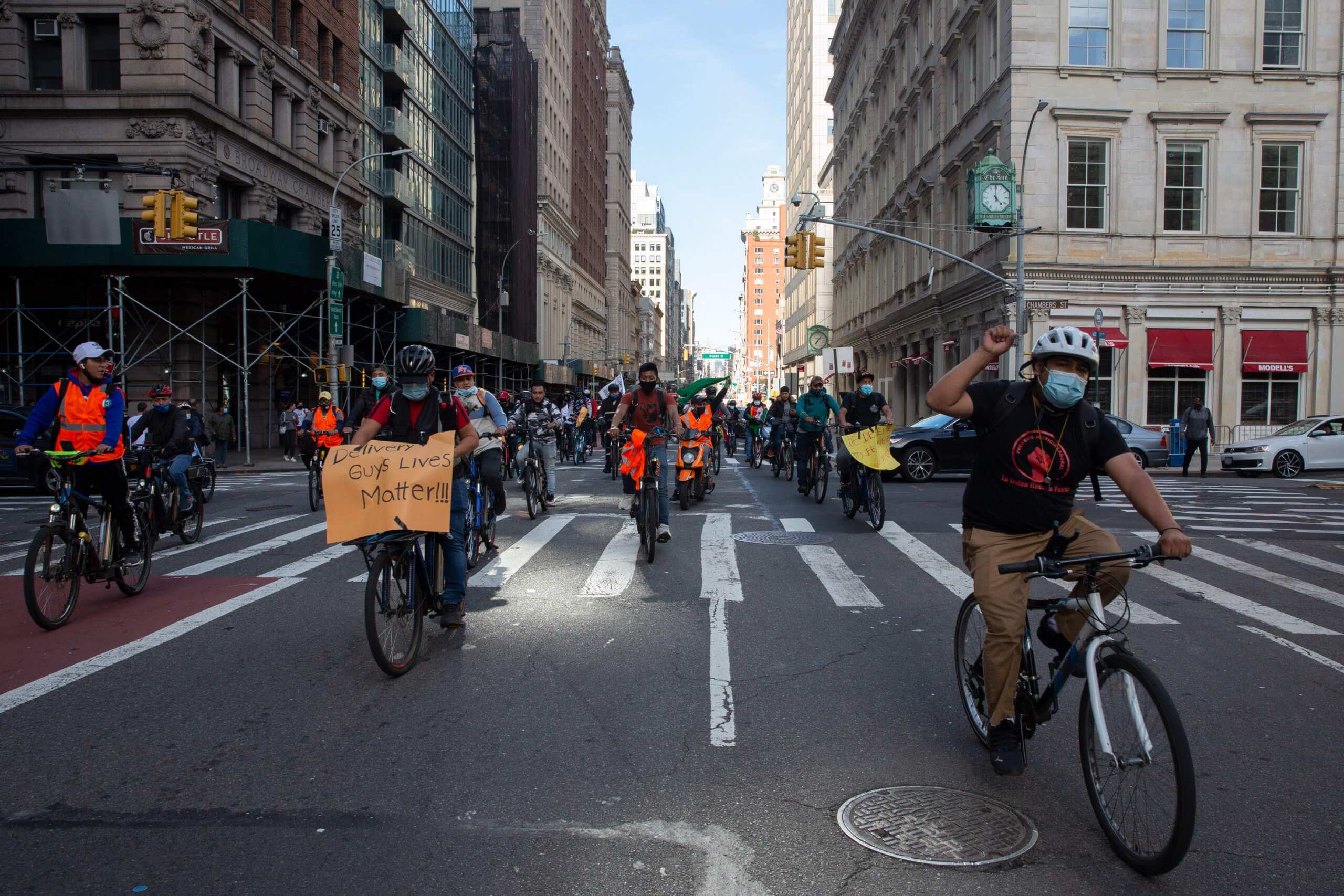
The city Department of Consumer and Worker Protection would be obligated to study working conditions and then issue rules establishing minimum per-trip payments, which would not include tips. Another bill would require that food delivery apps disclose to customers what portion of their tip is distributed to workers, how the tip is paid to them and what amount of each tip is used to make up workers base pay.
Yet another measure would prohibit online delivery companies from charging workers any fees to receive wages and tips, as well as require them to pay couriers at least once a week and offer at least one payment option that doesn’t require a bank account.
Regulating an ‘Indispensable Industry’
Hildalyn Colón Hernández, director of policy at the Workers Justice Project, a Brooklyn-based center that represents the Deliveristas, said the Council’s package can serve as a “framework” for other municipalities.
The City Council’s package received an endorsement from at least one of the food ordering companies, Grubhub.
Chicago-based Grubhub, one of the major tech companies involved in the app-based delivery sector, said through a spokesperson that “Grubhub supports the proposals the City Council is currently considering that would provide a number of new protections.”
But the possibility of a legal showdown with other app firms looms large.
A federal lawsuit filed earlier this month by delivery giants that include DoorDash, Uber Eats and Grubhub claims earlier Council action to cap fees they charge to restaurants amounts to unconstitutional overreach.
Last week, San Francisco-based DoorDash filed a lawsuit against the city over a new law approved in August that requires delivery companies to provide customer data to the restaurants that fulfill the orders.
Uber Eats declined to comment. Relay, a smaller New York City-based food delivery company that works with restaurants, did respond to requests for comment.
One of the thornier items, according to people familiar with the discussions, is a proposal by Councilmember Justin Brannan (D-Brooklyn) to allow delivery workers to set limits on how far they’re willing to travel for a delivery. They’d also be able to select which routes they want to take without fear their rating on the apps will decrease.
In an emailed statement, DoorDash said it had concerns with Brannan’s bill because it could lead to couriers to decline to deliver to some neighborhoods, leading to discrimination. DoorDash spokesperson Campbell Millum said the company recognized the “unique challenges” facing delivery workers in the five boroughs and would work with city officials.
“We will continue to work with all stakeholders, including the City Council, to identify ways to support all delivery workers in New York City without unintended consequences,” Millum said in an emailed statement.
Citing the survey released last week by the Cornell University School of Industrial and Labor Relations and the Workers Justice Project, Brannan said the report was a “scathing indictment on this unregulated, unsafe, yet completely indispensable industry.”
He added: “We cannot sit back and allow companies worth billions to profit off the backs and bikes of exploited workers.”
‘The Flags of Many Countries’
Councilmember Carlos Menchaca (D-Brooklyn), who introduced the payment bill, said the measures highlight “the grotesque nature of the style of capitalism that’s connected to these apps.”
“That for me, has been just one example of what they’ve been trying to get away with,” Menchaca added. “And they’re no longer going to get away with here.”
Another bill to be voted on would require that the third-party delivery platforms supply workers with insulated delivery bags. The app-branded thermal bags can cost up to $60, workers told THE CITY, and are an unofficial requirement for the job to keep food hot before it reaches the customer.
Los Deliveristas Unidos plan to host an event at City Hall Park Thursday as the Council readies to vote, offering bicycle tune-ups, assistance with NYPD bike registration and help filling out applications for state pandemic financial assistance.
A growing number of riders originally from Bangladesh and other countries will be joining the largely Mexican and Central American Deliveristas, members say.
“Our vision is that this movement includes the flags of many countries — there’s no race or color,” Ajche said. “It’s for every delivery worker who identifies with our movement.”
THE CITY is an independent, nonprofit news outlet dedicated to hard-hitting reporting that serves the people of New York.





